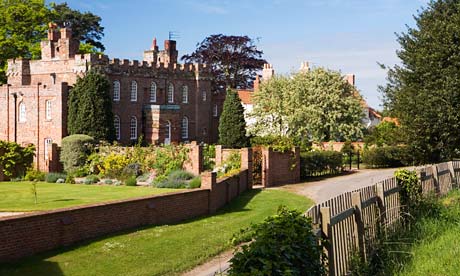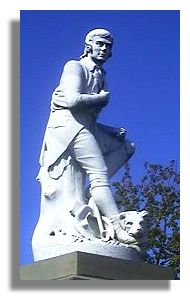I've alluded before to the long list of literary sites I have been compiling over the years. I haven't been to see any in quite a few years now and while I haven't lost all interest in them the lists have become lopsided and unwieldy in places, as well as inconvenient to keep up. Nonetheless I have been keeping them up, and I'm going to run some of the statistics here (this only counts things I have yet to see), starting with "Nations"
1. England--216
 I organized my countries according to FIFA regulations, so England, Scotland, Wales and Northern Ireland are counted as separate countries (no literary site on my current list is located on the Isle of Man)
I organized my countries according to FIFA regulations, so England, Scotland, Wales and Northern Ireland are counted as separate countries (no literary site on my current list is located on the Isle of Man)2. United States--126
3. France--63
4. Ireland--33
5. Italy--32
6. Scotland--30
7. Greece--22
8. Russia--21
9. Israel--19
10. Turkey--16
11. Germany--14
12. Egypt--13
Obviously I need to read more German literature, and where are the Spanish? (Spain is in 14th place currently, with 7 sites) Italy's number is inflated due to the Romans and the circumstance that a lot of English authors either lived there or wrote stories and poems about specific and easily identifiable places.
"England"
1. Middlesex (London)-71
 I should have stuck to the ancient county boundaries, but when I began my listings, I recorded them according to the re-organization of 1974. Apparently there was a further re-organization in the 90s however, so many of my designations no longer signify anything.
I should have stuck to the ancient county boundaries, but when I began my listings, I recorded them according to the re-organization of 1974. Apparently there was a further re-organization in the 90s however, so many of my designations no longer signify anything.On another note, the re-organization of internal boundaries that have sufficed for centuries has been one of the obvious symptoms of a nation's decline (widespread epicureanism is another), going back at least as far as the Roman Empire. This is why emotionally at least I am against doing this in the United States (or tearing up the Constitution and writing a new one, as some have argued is necessary) even if there are valid arguments for doing so.
2. Kent--14. I am continually surprised at how well Kent, which is not thought of as a literary region, does. Canterbury is the leading point accumulator in this county; besides the oft-referenced cathedral, a lot of writers either were born or lived there (Marlowe, Fletcher, Conrad, Maugham). Henry IV, king and also Shakesperean character, is buried in the cathedral as well.
3. Dorsetshire--13. Famous for Hardy, but Shelley and his wife and her parents, all noted authors, have connections to Bournemouth.
4. Cumbria--10. The Lake District. Wordsworth, Coleridge, DeQuincey, et al.
5. Somerset(shire?)--9. No dominant town or author (Bath used to belong to this county I think, but in my system is listed under the post-70s abomination of "Avon"), just a variety of different people.
Oxford and Cambridge come in much weaker than I would have thought. All of Cambridgeshire only has 3 sites on my list.
"United States"
1. (Tie) Massachusetts/New York-24
 Nearly all of these places are within easy driving distance of my house, which should be proof to you that I have not been carrying out the project of visiting the actual places with same fanaticism with which I have kept up the lists.
Nearly all of these places are within easy driving distance of my house, which should be proof to you that I have not been carrying out the project of visiting the actual places with same fanaticism with which I have kept up the lists.3. Mississippi--8. Not surprising. I was actually on my way to Mississippi once, getting as far as New Madrid, Missouri, before my wife made me turn around due to severe tornado warnings all across the area to which we were heading. That was in 2003, so I have still never made it there.
4. Ohio--7
5. (tie) Connecticut/New Jersey--6. These are mostly just birthplaces and graves, some of them obscure. For example William Ellery Leonard was born in Plainfield, NJ--I can find no other information on him, though I assume he is buried in Madison, Wisconsin. The Revolutionary War poet Philip Freneau, according to the 1904 edition of his collected works, is buried at the "Philip Freneau cemetery" in Matawan, NJ, but as I cannot find any mention of this place on the internet, I question whether it actually exists or not.
"London"
1. Westminster--15
 This is mainly people buried in the Abbey.
This is mainly people buried in the Abbey.
2. City--12. The square mile. This is where pretty much everyone pre-1800 lived and died. Unfortunately not much of that era is left.
3. (tie) Bloomsbury/Unknown--4. Unknown refers to people (usually very remote, like Spenser) whose birthplace is given as simply 'London', no street or house known.
5. (tie) Marylebone/Strand--3. A lot of people seemed to live in Marylbone in the late Victorian/Edwardian period, 1880-1914 or so. It's where Sherlock Holmes lived, I'm pretty sure. I don't remember what's in the Strand.
"Scotland"
1. (tie) Ayrshire/Dumfriesshire/Midlothian--6
 Another competitive country. Burns, who is the subject of more literary sites (10) than I think anyone (that should be another category) is resonsible for 5 in Ayrs, 4 in Dumfries, and 1 in Midlothian. Midlothian is otherwise where the very literary city of Edinburgh is located.
Another competitive country. Burns, who is the subject of more literary sites (10) than I think anyone (that should be another category) is resonsible for 5 in Ayrs, 4 in Dumfries, and 1 in Midlothian. Midlothian is otherwise where the very literary city of Edinburgh is located. No other county in Scotland notched more than 2 sites.
"France"
1. Seine--23. This is obviously Paris. Again I am going by their modern departments, which date I believe back to Napoleon at least, rather than the traditional ancient regions.
 2. Seine-Maritime--5. In Normandy. Rouen the major city. Joan of Arc, Flaubert, & Racine are identified with this region.
2. Seine-Maritime--5. In Normandy. Rouen the major city. Joan of Arc, Flaubert, & Racine are identified with this region.3. Vaucluse--4. In Provence. Avignon the town. Among the figures associated are Camus, John Stuart Mill, and Alain Chartier, author of the medieval love poem "La Belle Dame Sans Merci"
4. (tie)--Eure-et-Loire/Gironde/Indres-et-Loire/Loiret--3. The broken-up & famously castled and vineyarded Loire region showing some strength. Eure-et-Loire: Chartres and Proust's Cambray. Gironde is in Dordogne, capital is Bordeaux. Montaigne is the big guy there. Indres-et-Loire is the Tours (Balzac) and Chinon (Rabelais) neighborhood. Loiret is Orleans (Joan of Arc).
"Italy"
1. Lazio (Latium)-10
3. (tie) Campania/Emilio-Romagna--4. My impression is that Emilio-Romagna is not as overrun with tourists as the rest of Italy, but still has the kind of rich, beautiful, artistic ancient cities (Ravenna, Bologna, Parma, Ferrara, plus Rimini, the Blackpool/Jersey Shore of Italy), but on a smaller scale, that people love. Maybe I'll base myself there if I ever go back sometime.
5. Veneto--3
"Ireland"
1. Dublin--17
 The capital areas are far more dominant, and the universities much less so (Germany may be an exception), in most European literatures than New York has even been in this country, though it doesn't always seem that way. I used to lament a lot that Philadelphia had never really nurtured much of a literary scene or apparent talent, and that something in the environment must be inimicable to a literary sensibility. However, Reading, a dump of an industrial city of a 100,000 people about an hour west, managed to produce both Wallace Stevens and John Updike (Philadephia's most famous authors by comparison are Ben Franklin, who grew up in Boston, Louisa May Alcott, who moved to Boston when she was about 5, and the 30s communist playwright Clifford Odets).
The capital areas are far more dominant, and the universities much less so (Germany may be an exception), in most European literatures than New York has even been in this country, though it doesn't always seem that way. I used to lament a lot that Philadelphia had never really nurtured much of a literary scene or apparent talent, and that something in the environment must be inimicable to a literary sensibility. However, Reading, a dump of an industrial city of a 100,000 people about an hour west, managed to produce both Wallace Stevens and John Updike (Philadephia's most famous authors by comparison are Ben Franklin, who grew up in Boston, Louisa May Alcott, who moved to Boston when she was about 5, and the 30s communist playwright Clifford Odets).2. Galway--7. I forget who is responsible for all this Galway stuff. Yeats probably.
No other Irish county had more than 2 spots.
"Top Cities"
1. London--71.
3. Dublin--16
4. New York--8
5. Concord, Massachusetts--7. It's a little embarassing that this is in 5th place, but a lot of people lived there and there are a lot of museums and such. It's only about a hour from where I live, and it is a really beautiful and rich little town with delightful pastry shops and so on. I've only been there once, 13 years ago. This is the kind of place I ought to go to once every couple of years just to hang out in for a few hours and decompress from the vulgarity of most of modern life, but I never get around to it. Maybe this upcoming weekend.
6 (tie) Cambridge (Massachusetts)/Canterbury (England)/Edinburgh/ Jerusalem/Moscow/Rome/Troy (as in the Iliad)--6. That's a pretty good group there. Troy gets a point every time either one of its natives or itself is the subject of a work, usually a poem. I know there is nothing there but a bunch of stones and dirt and a reproduction of the Trojan horse. I've endured far more boring places.




No comments:
Post a Comment